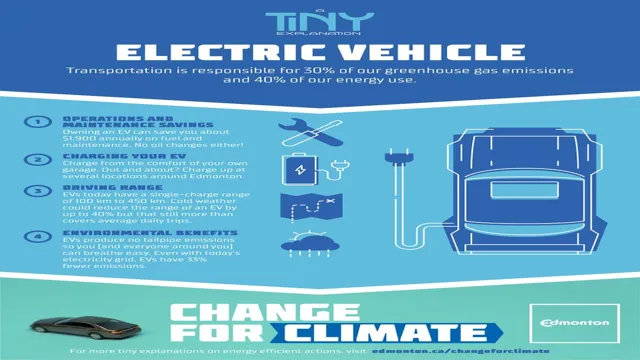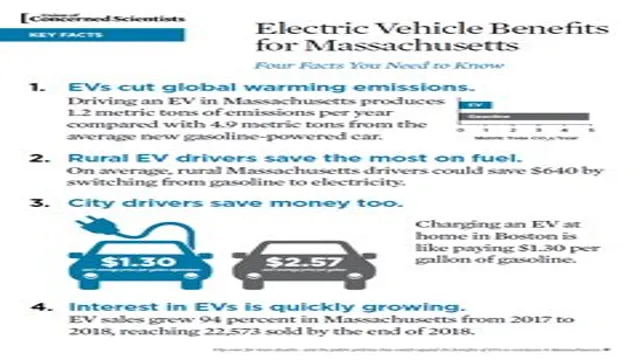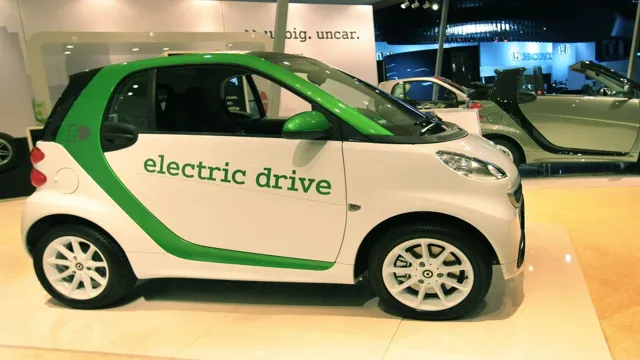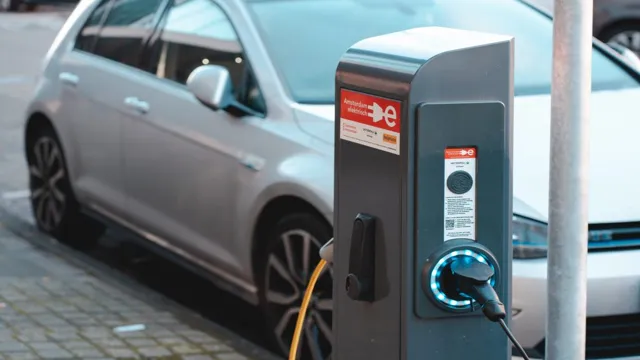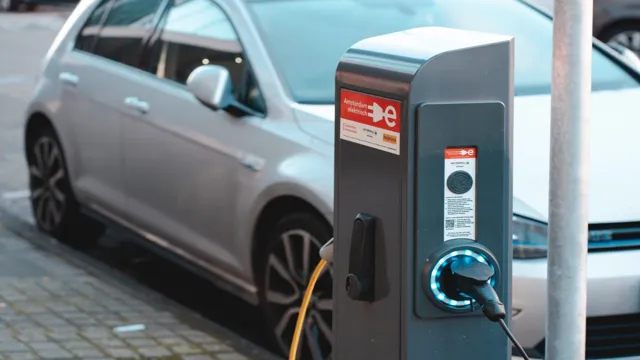Revolutionizing Transportation: The Undeniable Benefits of Producing Electric Cars
Electric cars have become an increasingly popular form of transportation all around the world. These cars run on rechargeable batteries instead of gasoline, providing a more eco-friendly option for drivers. Not only do electric cars help reduce harmful emissions in the environment, but they also offer a number of additional benefits to their drivers.
From cost savings to incredible performance, the advantages of owning an electric car are undeniable. So why exactly should you consider investing in one? Let’s explore the many benefits that come with driving an electric car.
Environmental Benefits
There are numerous benefits to producing electric cars, especially when it comes to the environment. Traditional gas-powered vehicles emit harmful greenhouse gases, contributing significantly to global warming and climate change. Electric vehicles, on the other hand, produce zero emissions, significantly reducing the overall carbon footprint of transportation.
This not only helps combat climate change but also improves air quality, promoting better health for people and wildlife. Additionally, the production of electric cars requires fewer natural resources and results in less waste compared to traditional vehicles. By reducing our reliance on fossil fuels and adopting cleaner transportation options, we can work towards a healthier and more sustainable world for all.
Reduced Greenhouse Gas Emissions
Reducing greenhouse gas emissions is crucial for mitigating the impacts of climate change, and renewable energy could be a significant part of the solution. As we know, traditional sources of energy, such as fossil fuels, are the primary cause of greenhouse gas emissions. However, renewable sources of energy, such as hydro, wind, and solar, can reduce greenhouse gas emissions considerably, as they do not emit any carbon or other greenhouse gases while producing electricity.
Compared to fossil fuels, renewable energy systems have lower operating costs, and the energy produced is enough to power thousands of homes. Thus, promoting the utilization of renewable energy sources can be a sustainable way of reducing greenhouse gas emissions. Renewable energy has the potential to create stable employment opportunities, improve energy security, and protect the environment.
Additionally, renewable energy can help meet the increasing demand for energy worldwide, leading to a sustainable future where economic development and environmental preservation can exist simultaneously. Today, the world is starting to transition to renewable energy, with some countries like Germany, Sweden, and Costa Rica already using renewable energy as their primary source of electricity. As more countries transition to renewable energy, we can reduce our greenhouse gas emissions, mitigate climate change, and pave the way for a sustainable future.
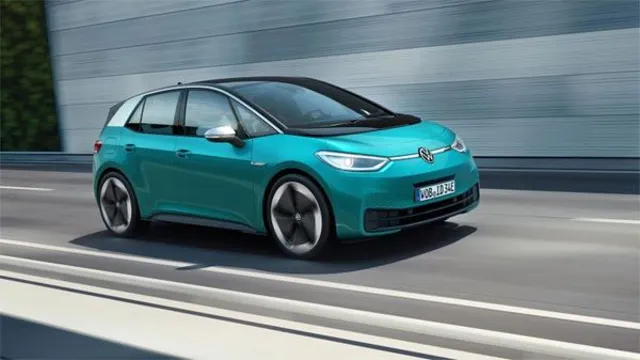
Decreased Air Pollution
With the implementation of stricter environmental regulations and the shift towards sustainable practices, we have seen a decrease in air pollution. This has been a significant benefit for not only the environment but also for human health. The decrease in air pollutants such as ozone, particulate matter, and nitrogen dioxide has led to a reduction in respiratory and cardiovascular diseases.
It also benefits ecosystems, as air pollution can harm plants and animals as well. While we still have a long way to go to achieve complete elimination of air pollution, the progress made so far is a step in the right direction. By prioritizing sustainability and making conscious choices, we can continue to improve air quality and create a healthier planet for ourselves and future generations.
Less Noise Pollution
Less Noise Pollution – Environmental Benefits Have you ever noticed how noisy our surroundings can get? It seems like there’s always some kind of construction work, honking cars, or loud music playing somewhere nearby. We often don’t give it much thought, but the truth is that noise pollution can have serious environmental impacts. For one, it can disrupt the natural behavior of animals, making it harder for them to communicate, find food, or mate.
It can also the soil, water, and air quality, leading to long-term damages that affect the entire ecosystem. Additionally, prolonged exposure to high levels of noise can have negative effects on our own health and well-being. By reducing noise pollution, we can create a more peaceful and healthy environment for all living beings.
So, next time you consider blasting your music or revving your engine, think twice and consider the impact it may have on the world around you.
Financial Benefits
One significant benefit of producing electric cars is the financial advantages they provide. For individuals, electric cars can save money on fuel costs, with electric charging being significantly cheaper than gasoline or diesel. Moreover, electric cars have fewer moving parts and require less maintenance, which can reduce repair costs.
Governments also benefit from producing electric vehicles as they can reduce their oil import bills while increasing their energy security. Investing in electric cars can also create jobs in the local and national economy as there is a need for technicians to manage charging stations and maintain vehicles. Another financial benefit of electric cars is that they have a longer lifespan than traditional cars, reducing the frequency of replacement and repair.
Overall, the financial advantages of producing electric cars are beneficial for both individuals and governments, helping to reduce costs, create jobs and promote economic growth.
Lower Fuel Costs
Lower fuel costs can lead to significant financial benefits for both individuals and businesses. With fluctuating fuel prices, it can be challenging to manage transportation costs, but by investing in fuel-efficient vehicles or adjusting driving habits, these costs can be significantly reduced. In addition to saving money on fuel, lower fuel costs can also lead to reduced maintenance and repair expenses as efficient vehicles tend to have lower wear and tear on their components.
Furthermore, businesses can take advantage of tax incentives available for using alternative fuels or implementing energy-efficient practices. By reducing the expenses associated with transportation and logistics, businesses can improve their bottom line and reinvest the savings in other areas of their operations, leading to increased profitability. Overall, the financial benefits of lower fuel costs can have a significant impact on both individuals and businesses, making it a crucial factor to consider when making transportation decisions.
Government Incentives
Government incentives can provide many financial benefits to individuals and businesses. These incentives are designed to stimulate economic growth and support certain industries. For individuals, there are tax credits and deductions available for things like energy-efficient home improvements, buying an electric vehicle, or contributing to a retirement account.
Businesses can take advantage of tax breaks for investing in research and development, hiring employees from certain disadvantaged groups, or purchasing equipment and machinery. Incentives may also be available for starting or expanding small businesses. Taking advantage of these government incentives can save individuals and businesses money and help create a more prosperous economy.
So why not see if you qualify for any of these financial benefits and start reaping the rewards?
Less Maintenance Required
One of the many financial benefits of choosing low-maintenance options for your home or business is the reduced need for repairs and upkeep. When you invest in high-quality materials and products that require little attention, you can save money on both short-term and long-term maintenance costs. For instance, opting for durable, low-maintenance siding over high-maintenance wood siding can save you thousands of dollars in painting and repairs over the years.
Similarly, choosing a metal roof over a traditional asphalt shingle roof can help you avoid costly leaks and replacements down the road. By making smart decisions about the materials and products you choose for your property, you can achieve significant savings and feel more confident in your financial stability.
Convenience Benefits
One of the biggest conveniences of producing electric cars is their low maintenance requirements. Unlike traditional gasoline-powered cars, electric cars have fewer moving parts, eliminating the need for routine oil changes, tune-ups, and more. Additionally, electric cars can be charged at home or at public charging stations, eliminating the need to visit gas stations.
This not only saves time but also money, as electric cars typically cost less to maintain in the long run. Electric cars also provide a quieter and smoother ride, with instant torque and acceleration. Drivers no longer have to deal with jerky gear changes or loud engine noises.
With electric cars becoming more popular and accessible, it’s clear that the benefits go far beyond just environmental sustainability.
Charging at Home
Charging your electric vehicle at home provides a level of convenience that traditional gas-powered cars simply cannot match. Picture this: you return home from a long day at work and pull your car into your garage. Instead of making a detour to the gas station, you simply plug in your electric vehicle and relax.
Not only do you save time by avoiding trips to the gas station, but you can also schedule your charging times to suit your needs. For instance, you can program your car to charge during off-peak hours when electricity rates are lower. Charging at home is as easy as plugging in your phone, and you get all the benefits of a full charge by the time you wake up the next day.
No more rushing to the gas station or waiting in long lines. With home charging, you have the freedom to charge on your own terms.
Fewer Trips to the Gas Station
When it comes to owning a car, one of the biggest conveniences is being able to go where you want, when you want. However, one of the biggest inconveniences of owning a car is having to constantly stop at the gas station to fill up the tank. This is where electric cars come in – with an electric vehicle, you have the convenience of not having to stop for gas nearly as often.
Instead, you can simply plug in your car at home or at a charging station and let it charge while you go about your day. And with the increasing availability of charging stations across the country, there are now more options for charging up while on the go. So, not only are electric cars better for the environment, but they also offer added convenience by reducing the need for frequent trips to the gas station.
Performance Benefits
Producing electric cars brings numerous benefits, particularly in terms of performance. Electric vehicles offer instant torque delivery, resulting in quick acceleration and smooth driving. This produces a more responsive and agile driving experience compared to traditional combustion engines.
Moreover, electric cars operate silently, meaning no engine noise, so drivers and passengers can enjoy a peaceful ride. Another advantage is the lower center of gravity of electric cars, which improves handling and stability. Electric vehicles also require less maintenance since they have fewer moving parts and no oil changes.
These benefits not only improve the driving experience but also offer environmental benefits, such as reduced emissions, making electric cars an increasingly popular choice among consumers and automakers worldwide.
Conclusion
In conclusion, the benefits of producing electric cars are electrifying! Not only do they reduce greenhouse gas emissions and promote a cleaner environment, but they also offer a smooth and quiet ride, lower operating costs, and the potential for renewable energy sources. Plus, with technological advancements and increased demand, electric cars are becoming more accessible and affordable for drivers around the world. So let’s charge up and drive towards a brighter, greener future with electric cars!”
FAQs
What are the environmental benefits of producing electric cars?
Electric cars produce zero emissions, meaning they do not contribute to air pollution, greenhouse gas emissions, and other harmful environmental effects.
How do producing electric cars contribute to reducing dependence on foreign oil?
Electric vehicles use domestically-produced electricity as their fuel source, reducing our country’s dependence on foreign oil imports.
Are electric cars cheaper to maintain and operate compared to traditional gas-powered vehicles?
Yes, electric cars typically have fewer moving parts, require less frequent maintenance, and have lower fuel costs, resulting in overall lower operating costs.
What are the long-term economic benefits of producing electric cars?
The development and production of electric vehicles create job opportunities and encourage innovation and investment in the renewable energy sector, leading to long-term economic growth.
